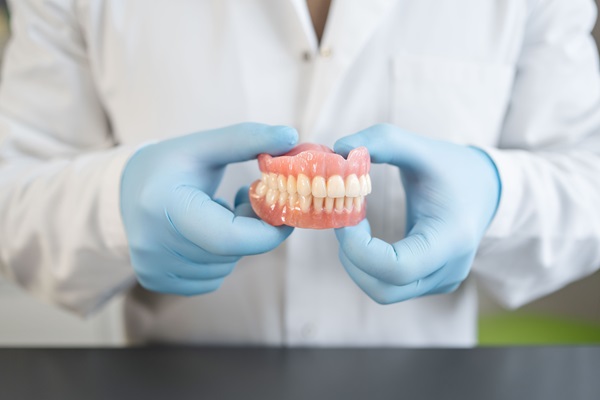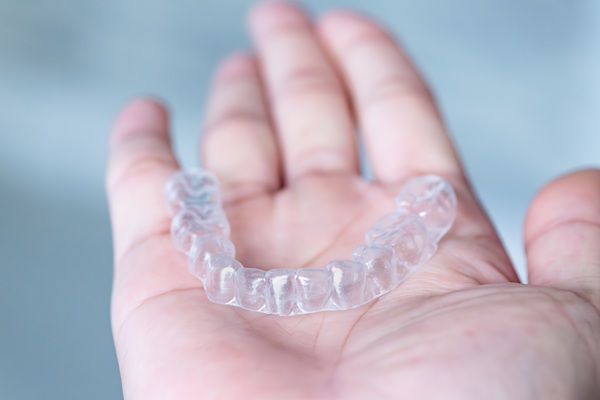When Adhesives Are Recommended for Dentures

Denture adhesives are a great way to keep your removable dentures in place. This guide is designed to help you determine if adhesives for dentures are right for you. A common concern that denture wearers have is that their dentures may come loose at an inopportune time, and denture adhesives offer a way to help prevent that from happening. Read on to learn more.
When might a dentist recommend adhesive for dentures?
Denture adhesives may be necessary if you are having issues keeping your dentures in place or if they no longer fit comfortably. While dentures that do not fit properly may need an adjustment or a replacement, adhesives can be a great aid for dentures that are relatively new and in good condition.
What are denture adhesives?
Denture adhesives are a way to securely keep dentures in place while they are worn. They are available from your dentist or over-the-counter. There are also different types of denture adhesives to consider based on the issue(s) you are having. Adhesives come in creams, powders, strips, or pads.
Be sure to discuss the pros and cons of each denture adhesive type with your dentist to determine which is most appropriate for your needs and preferences.
How do I use a denture adhesive?
Your dentist can help you learn to use the denture adhesives you choose, and each type requires a different process. Here is a general guide on using the most common types of denture adhesives:
- Creams: Apply a short strip of the denture adhesive cream to the undersurface of your denture. Hold the denture in place and bite down firmly to secure its position
- Powders: Apply a layer of powder across the undersurface of the dentures. Shake off the excess powder, and then press and hold the dentures into place, biting down to secure their position
- Strips: Place the strips in water to moisten them. Place on the undersurface of your denture and press down; bite down to secure the dentures into place
Of course, every brand may have unique (and more detailed) instructions. In general, dental adhesives work similarly to glue, and they rest upon the gums to securely hold the dentures in place.
When are adhesives for dentures recommended?
Denture adhesives are often recommended for many dental patients that wear dentures, regardless of how well their dentures fit without them. However, they are especially recommended if dentures do not fit the way that they should. It should be noted that they are not an alternative to dentures that no longer fit properly due to shifting teeth, shifting jawbone, or damage to the dentures, in which case a denture adjustment or replacement may be necessary.
Are denture adhesives necessary?
Denture adhesives are not necessary, and properly customized dentures typically fit well without them. In fact, some patients prefer not to use them. With that said, they may become necessary if the patient’s dentures become loose. Whether or not dentures need replacement or the use of denture adhesives for your current dentures is more appropriate depends on your specific situation. It is best to visit a dentist to discuss your options and find the best path if you are having any issues with the fit of your dentures.
What can I expect with denture adhesives?
Denture adhesives should feel comfortable and not cause pain or gum swelling. The dentures should also not come out of place or feel loose with adhesives as well, and it is a sign that there are issues with either the adhesives and/or the dentures themselves if any complications develop. With that said, it may take some time to adjust to the new feel with denture adhesives, so as long as they fit securely and do not cause discomfort or swelling, then it may be best to give it a few days to see if the adjustment is taking time. However, if complications develop, then it is best to notify your dentist and schedule a visit to have them assessed.
The bottom line
Contact our dental office today to learn more about adhesives for dentures and to determine whether they are right for you. During your visit, we can also address any other concerns you are experiencing with your dentures. In addition, we offer denture treatment for patients who have yet to choose a teeth-replacement solution. So why wait? Contact us today, and our friendly team can arrange a convenient time for you to visit.
Request an appointment here: https://rimfd.com or call Rim Dental at (210) 693-1939 for an appointment in our San Antonio office.
Check out what others are saying about our dental services on Yelp: Dentures and Partial Dentures in San Antonio, TX.
Related Posts
For some people, the idea of getting dentures can be a scary prospect. If you are in this situation, it may mean that you have lost most or all of your teeth. This could have happened because they were severely decayed or many of them were damaged in a serious accident. Regardless of why you…
As teeth get older, you may have to consider replacing them with dentures or partial dentures. This can lead to a lot of questions, especially if a person has never owned dentures previously. It is important to understand the current condition of one’s teeth in order to determine the right denture fit. Teeth naturally wear…
Having missing teeth can make normal tasks such as eating or speaking difficult, but there are several tooth replacement options available to allow you to restore function and improve the appearance of the mouth. Learn more about what alternatives are available to patients and the potential benefits of each method.Depending on the situation and how…
Dental implants are often used to replace individual teeth but can also offer multiple teeth replacement options. Such options include cantilever bridges, implant-supported bridges and implant-supported partials.Depending upon the condition of the person's gums and jawbone, a single implant can sometimes be placed to support two adjacent teeth. More commonly, multiple implants are used to…


